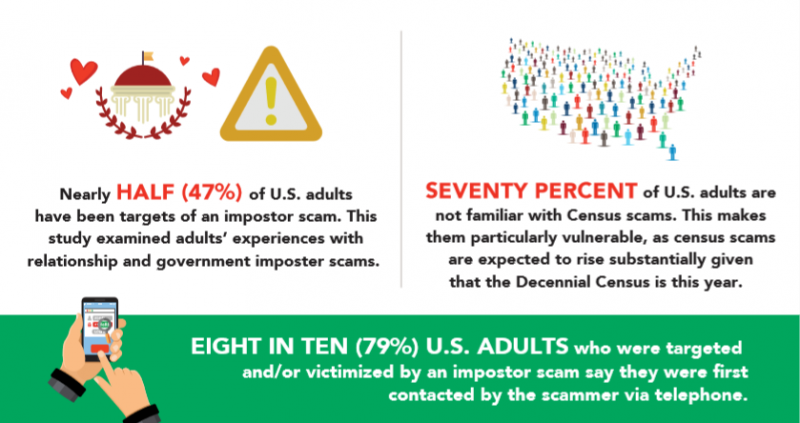Half of U.S. Adults Have Been Targeted by Impostor Scams, Says AARP Survey
With 2020 Census Pending, Findings Show Many May Not Recognize Expected Census Scams
WASHINGTON, D.C. –Impostor scams continue to target large numbers of Americans, and as the federal government launches the 2020 Census, a majority may be susceptible to phony Census correspondence or telephone calls, according to results of a survey released today by the AARP Fraud Watch Network.
The study, “The Impostors: Stealing Money, Damaging Lives,” focused on government impostor scams, in which criminals pose as representatives of agencies such as the IRS, Social Security Administration or Census Bureau; and relationship scams, when fraudsters pretend to be a relative or someone seeking a romantic relationship online. Researchers also probed the effects of fraud schemes on intended victims.
Nearly half of U.S. adults (47%) reported that they have been targeted by an impostor scam, according to the AARP survey. The Federal Trade Commission received 647,000 reports of imposter scams during 2019, more than any other type of fraud; the FTC says government impostor scams increased more than 50 percent over 2018.
The Decennial Census presents a new opportunity for the criminals who impersonate government officials, and AARP’s survey shows that many consumers may be at risk:
- Seventy percent of respondents were incorrect or unsure about whether the Census Bureau would contact them via email. Invitations to participate in the Census actually will be sent via U.S. mail.
- More than a third (35%) expect or are unsure whether the Census questionnaire will ask for their Social Security number. The Census Bureau says it will never ask for sensitive information such as Social Security number, bank account information or passwords, or request payment of a fee.”
“We’ve learned that scammers are very shrewd and adept at capitalizing on current events,” said Kathy Stokes, director, fraud prevention programs, AARP. “The Census has been in the news, so most people are expecting to hear soon from the Census Bureau. Scammers will use that to their advantage as they aim to deceive people into sharing sensitive information or handing over money.”
Invitations to respond to the Decennial Census will be mailed to U.S. households in March. Responses to the Census questions may be submitted online or via mail or telephone. By May, Census workers will begin visiting or contacting households that have not yet responded.
For assistance with recognizing potential Census scams, see the tip sheet from the AARP Fraud Watch Network.
The toll of imposter scams goes beyond the financial impact, according to the AARP survey. Among those who have been targeted and/or victimized, 18% reported that they experienced health problems or emotional distress as a result of the encounter. People ages 18 to 49 reported health or emotional issues at a higher rate than those age 50 or older.
Among other findings of the survey:
- Forty-five percent of people age 50 and older have been contacted by a government impostor, as compared to 35% of those ages 18 to 49.
- Two in five U.S. adults use dating websites, apps or online social groups to find potential dates or romantic partners. Of those, half encountered one of the “red flags” of romance fraud, including requests for money.
- The majority of U.S. adults are at least somewhat familiar with government impostor scams and relationship scams (including romance fraud and the grandparent scam) -- indicating that efforts by AARP and other consumer advocates to increase public awareness are working. However,
- Fifty-five percent of survey respondents failed a 10-question fraud safety quiz.
AARP members and the public are invited to learn more about impostor scams and other fraud schemes by participating in an Online Community Q&A during February. Amy Nofziger, director, fraud victim support, is the host, and will answer your questions and take comments about scams you have encountered.
The AARP Fraud Watch Network launched in 2013 as a free resource for people of all ages. Consumers may sign up for “Watchdog Alert” emails that deliver information about scams, or call a free helpline at 877-908-3360 to report scams or get help from trained volunteers in the event someone falls victim to scammers’ tactics. The Fraud Watch Network website provides information about fraud and scams, prevention tips from experts, an interactive scam-tracking map and access to AARP’s hit podcast series, The Perfect Scam.
# # #
Survey Methodology
Online survey via NORC’s AmeriSpeak® Panel, a probability-based panel with sample targeting U.S. adults ages 18 and older. AmeriSpeak is designed to be representative of the U.S. household population. Qualifications: Ages 18 or older; goes online or accesses the Internet (e.g., sending or receiving email). Sample: NORC’s AmeriSpeak® Panel, n=2,273 adults ages 18 and over. Interviewing Dates: Dec. 18, 2019, to Jan. 20, 2020. Weighting: Sample data are weighted to the U.S. population by age, gender, race/ethnicity, and Census division. Margin of error: ±2.18 percent at the 95% confidence level. For more detail, see the research report.
About AARP
AARP is the nation’s largest nonprofit, nonpartisan organization dedicated to empowering people 50 and older to choose how they live as they age. With a nationwide presence and nearly 38 million members, AARP strengthens communities and advocates for what matters most to families: health security, financial stability and personal fulfillment. AARP also produces the nation's largest circulation publications: AARP The Magazine and AARP Bulletin. To learn more, visit http://www.aarp.org or follow @AARP and @AARPadvocates on social media.
CONTACT:
Mark Bagley, 202-434-2560, mbagley@aarp.org
























































